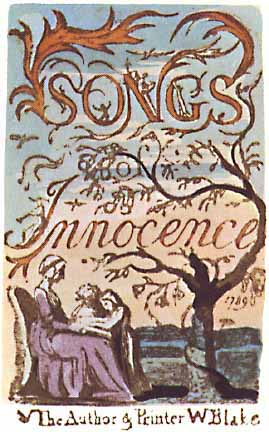|
. Songs of Innocence 
1. Introduction 
Piping down the valleys wild Piping songs of pleasant glee On a cloud I saw a child. And he laughing said to me.
Pipe a song about a Lamb; So I piped with merry chear, Piper pipe that song again— So I piped, he wept to hear.
Drop thy pipe thy happy pipe Sing thy songs of happy chear, So I sung the same again While he wept with joy to hear
Piper sit thee down and write In a book that all may read— So he vanish'd from my sight. And I pluck'd a hollow reed.
And I made a rural pen, And I stain'd the water clear, And I wrote my happy songs Every child may joy to hear Questions a. What difference does this have as an invocation in comparison with other regular ones? What does it tell you about the poet's unique intention?
b. Does the style of this poem tell you anything at all?
c. This surely contains a pastoral vision. Any unique aspect? 2. The Chimney Sweeper 
When my mother died I was very young, And my father sold me while yet my tongue Could scarcely cry " 'weep! 'weep! 'weep! 'weep!" So your chimneys I sweep & in soot I sleep.
There's little Tom Dacre, who cried when his head That curled like a lamb's back, was shaved, so I said, "Hush, Tom! never mind it, for when your head's bare, You know that the soot cannot spoil your white hair."
And so he was quiet, & that very night, As Tom was a-sleeping he had such a sight! That thousands of sweepers, Dick, Joe, Ned, & Jack, Were all of them locked up in coffins of black;
And by came an Angel who had a bright key, And he opened the coffins & set them all free; Then down a green plain, leaping, laughing they run, And wash in a river and shine in the Sun.
Then naked & white, all their bags left behind, They rise upon clouds, and sport in the wind. And the Angel told Tom, if he'd be a good boy, He'd have God for his father & never want joy.
And so Tom awoke; and we rose in the dark And got with our bags & our brushes to work. Though the morning was cold, Tom was happy & warm; So if all do their duty, they need not fear harm. Questions a. A social criticism. In what sense?
b. The narrator's point of view, is it different from Tom Dacre's?
c. Is there any irony in the moral lesson at the ending? 3. Holy Thursday 
Twas on a Holy Thursday their innocent faces clean The children walking two & two in red & blue & green Grey-headed beadles walkd before with wands as white as snow, Till into the high dome of Pauls they like Thames waters flow
O what a multitude they seemd these flowers of London town Seated in companies they sit with radiance all their own The hum of multitudes was there but multitudes of lambs Thousands of little boys & girls raising their innocent hands
Now like a mighty wind they raise to heaven the voice of song Or like harmonious thunderings the seats of Heaven among Beneath them sit the aged men wise guardians of the poor Then cherish pity, lest you drive an angel from your door Questions a. A Criticism on the Church. In what respect? b. Does "multitudes" mean anything at all?
c. The visual image at Stanza 3. What does it tell you?
 
|